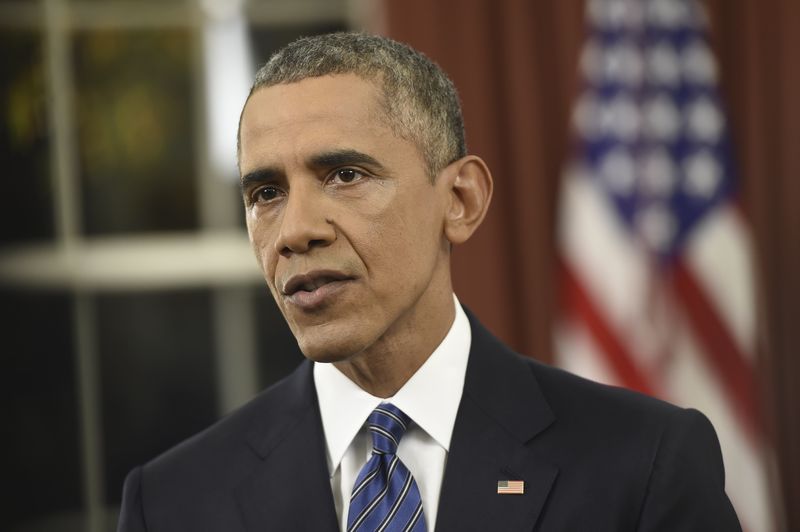By Matt Spetalnick, Roberta Rampton and Jeff Mason
WASHINGTON (Reuters) - President Barack Obama on Sunday laid out the most sweeping defense yet of his strategy to defeat Islamic State, but he offered no U.S. policy shift to confront what he called a "new phase" in the terrorist threat after a mass shooting in California.
In a rare Oval Office address, Obama sought to calm a U.S. public increasingly jittery about the fight against Islamist militancy that once appeared to be waged overseas. His remarks failed to quiet Republican critics who have long accused him of underestimating the militants' strength and staying power.
Speaking in a measured tone, Obama used his 14-minute nationally televised appearance to draw a careful line about what he would and would not do. He pledged, for example, to "hunt down terrorist plotters" anywhere they are. But he insisted: "We should not be drawn once more into a long and costly ground war in Iraq or Syria."
Obama spoke just four days after U.S.-born Syed Rizwan Farook, 28, and his Pakistani wife, Tashfeen Malik, 29, opened fire on a holiday party for civil servants in San Bernardino, California, killing 14 people. The pair were killed hours later in a shootout with police.
Obama condemned the attack as "an act of terrorism designed to kill innocent people." But he also said San Bernardino showed that "the terrorist threat has evolved into a new phase" as Islamic State used the Internet to "poison the minds" of potential assailants.
Obama also made a connection between national security and the need for gun control following America's latest mass shooting.
The FBI is investigating the paramilitary-style attack in California as inspired by Islamic State, which controls swaths of Syria and Iraq and has shown an expanded reach beyond its Middle East strongholds, including complicity in the Nov. 13 assaults in Paris that killed 130 people.
But Obama, whose restraint contrasted sharply with French President Francois Hollande's impassioned words after the Paris attacks when he vowed a "merciless" response, said there was no evidence the California assault was directed by a militant group overseas or part of a broader conspiracy at home.
Nevertheless, Obama sought to show his administration was on top of the crisis, despite new questions raised about the country's defenses against homegrown extremism.
"The threat from terrorism is real but we will overcome it," Obama said.
Obama's Republican critics, including the party's presidential candidates, quickly panned his speech, just the third he has delivered from the Oval Office since he took office in January 2009.
"People are scared not just because of these attacks but because of a growing sense that we have a president that is completely overwhelmed by them," Florida Senator Marco Rubio, who is seeking the Republican presidential nomination for the November 2016 election, told Fox News.
DIGITAL DEBATE LOOMING WITH SILICON VALLEY
Delivering his speech from a lectern, Obama called on Silicon Valley to help address the threat of militant groups using social media and electronic communications to plan and promote violence, setting up renewed debate over personal privacy online.Obama also seized the opportunity to make the case again for U.S. gun control, something he has done to little avail because of stiff Republican resistance, following numerous shooting sprees during his presidency.
"We also need to make it harder for people to buy powerful assault weapons like the ones that were used in San Bernardino," Obama said. "What we can do - and must do - is make it harder for them to kill." A senior administration official said Obama had no immediate plans to visit San Bernardino.
At the same time, Obama cautioned against overreaction to the militant threat at home.
"We cannot turn against each other by letting this fight be defined as a war between America and Islam," he said, alluding to the incendiary rhetoric by Republican presidential candidates like Donald Trump, which is seen by critics as fear-mongering against the Muslim community.
Given that the California couple were not on the U.S. national security radar before they launched their shooting spree on Wednesday, Obama faced the challenge of convincing the U.S. public he is doing everything possible to deal with an evolving militant threat.
There was mounting evidence that the pair were "lone wolf" assailants who may have become radicalized by Islamic State propaganda and then acted independently, making it all the more difficult for authorities to track them.
Last week's massacre, if proven to be linked to or motivated by foreign Islamist militancy, would be the deadliest such incident on U.S. soil on Obama's watch and since the Sept. 11, 2001, hijacked plane attacks on New York and Washington.
Obama's address came amid growing pressure from Republicans and even some Democrats for a tougher response to Islamic State now that the San Bernardino shootings have raised fears among Americans about the threat of more attacks at home.
Obama's last speech in the Oval Office, a symbol of presidential power, was in August 2010, when he hailed the end of U.S. combat operations in Iraq, a milestone in his campaign promise to extract the United States from the war there.
His policy was upended, however, with the meteoric rise of Islamic State.
Since late last year, Obama has deployed about 3,500 U.S. troops back to Iraq on a train-and-advise mission. The Pentagon announced last week it was sending scores more in a special operations expeditionary force against Islamic State. Critics are calling for more aggressive action.

Among the few specific requests in his speech was for Congress to pass legislation that would block individuals who are on the government no-fly list from purchasing guns. That would not have stopped the California couple, however, since they were not on any government terrorism watch list.